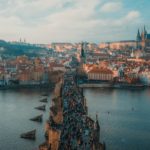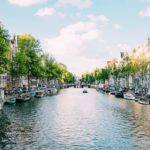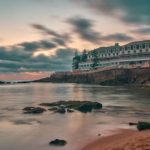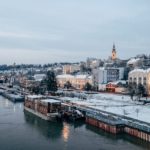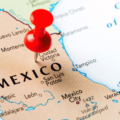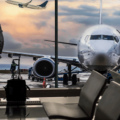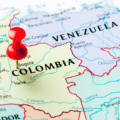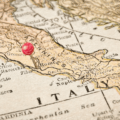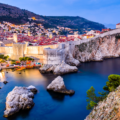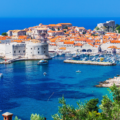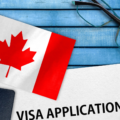Are you a digital nomad searching for your next exciting destination? The challenge of finding that perfect blend of work and adventure can be daunting. During my research, Sofia, Bulgaria caught my eye with its vibrant tech scene and affordable living.
This guide will walk you through everything you need to know about making Sofia your temporary home base. So grab a cup of coffee, get comfy, and let’s explore this hidden gem in the heart of the Balkans together.
Who knows? You might just fall in love with Sofia’s charm and decide to extend your stay.
Key Takeaways
- Sofia offers affordable living costs, with monthly expenses around 800 EUR and apartment rentals from 300-800 EUR in the city center.
- The city has excellent coworking spaces like betahaus and SOHO Sofia, providing fast internet and networking opportunities for digital nomads.
- Popular neighborhoods for remote workers include Lozenets, Studentski Grad, and Central Sofia, each offering unique amenities and atmospheres.
- Sofia’s location makes it easy to take day trips to nearby attractions like Vitosha Mountain for hiking or the ancient city of Plovdiv.
- The city has a vibrant social scene with many bars, clubs, live music venues, and networking events for expats and digital nomads to connect.
Why Choose Sofia for Digital Nomad Life?

Sofia has become a digital nomad hotspot, and for good reason. I’ve found the city offers an unbeatable combination of affordability and quality of life. The cost of living here is significantly lower than in other European capitals, allowing me to stretch my budget further.
Yet, I don’t compromise on amenities. The city boasts excellent internet connectivity, crucial for remote work. Plus, its compact size makes it easy to explore, with Vitosha Mountain right at the doorstep for outdoor adventures.
The international flavor of Sofia adds to its appeal. I’ve met fellow nomads from all over the world here, creating a vibrant community. The friendly atmosphere makes it easy to connect and network.
What’s more, Sofia serves as a great base for exploring the region. I can hop on a quick flight to the Black Sea coast or take a day trip to historic Plovdiv. As one local entrepreneur told me:.
Sofia gives you the best of both worlds – a modern, connected city with a rich cultural heritage. It’s the perfect launchpad for digital nomads.
Getting to Sofia
Sofia welcomes digital nomads with open arms and easy access. The city’s international airport connects to major European hubs, making it a breeze to fly in from around the globe.
Air Travel Options
As a digital nomad, I’ve found Sofia’s air travel options to be convenient and varied. Sofia Airport serves as the main gateway to the city, offering connections to major European hubs.
I often fly directly from London, Paris, or Frankfurt, which saves time and hassle. These routes run frequently, giving me flexibility in my travel plans.
For budget-conscious travelers, low-cost carriers like Wizz Air and Ryanair operate flights to Sofia from various European cities. I’ve snagged some great deals, especially during off-peak seasons.
It’s worth noting that Sofia is just a 50-minute flight from the Black Sea coast, perfect for quick beach getaways.
I always check for alternative routes when planning my trips. Sometimes, flying into nearby airports like Plovdiv or Bucharest and taking a bus or train to Sofia can be more cost-effective.
This approach has allowed me to explore more of the region while saving money on airfare. The city’s central location in the Balkans makes it an ideal base for further travels in Eastern Europe.
Land and Rail Access
Getting to Sofia by land or rail is straightforward and efficient. I’ve found the city well-connected to major Bulgarian hubs through an extensive rail network. Trains from Plovdiv, Bulgaria’s second-largest city, arrive in about 2.5 hours.
Buses offer another convenient option, with routes connecting Sofia to nearby countries like Serbia, Greece, and Turkey.
Sofia’s accessibility by land and rail makes it an ideal base for digital nomads exploring Eastern Europe.
For those coming from within Bulgaria, the bus system is reliable and affordable. I often recommend the comfortable coaches running between Sofia and popular destinations like Bansko or Veliko Tarnovo.
The central bus and train stations are conveniently located near the city center, making it easy to start your Sofia adventure as soon as you arrive.
Best Neighborhoods for Digital Nomads
Sofia offers diverse neighborhoods perfect for digital nomads. Each area has its own charm and amenities, catering to different preferences and lifestyles.
Lozenets
I’ve spent countless hours exploring Sofia’s neighborhoods, and Lozenets stands out as a top pick for digital nomads. This area offers excellent internet connectivity, crucial for remote work.
I’ve found the atmosphere here friendly and welcoming, making it easy to settle in and focus on projects.
Rental prices in Lozenets are reasonable, ranging from 7 to 13 Euros per square meter. This affordability allows digital nomads to find comfortable living spaces without breaking the bank.
During my time here, I’ve enjoyed the neighborhood’s proximity to city parks, perfect for unwinding after a long day of work.
Lozenets boasts a well-connected transport network, making it easy to explore other parts of Sofia. The neighborhood’s location also provides quick access to music festivals and Vitosha Mountain, offering plenty of opportunities for leisure and adventure.
Next, let’s explore another popular area for digital nomads in Sofia.
Studentski Grad
Studentski Grad is a bustling district in Sofia that’s perfect for digital nomads seeking a lively atmosphere. This vibrant neighborhood pulses with energy, thanks to its large student population.
I’ve found it to be an ideal spot for remote workers who enjoy a mix of work and play.
The area boasts numerous affordable housing options, from shared apartments to budget-friendly hostels. I’ve noticed many digital nomads opt for short-term rentals here, allowing flexibility in their stay.
The streets are lined with cozy cafes, perfect for a quick work session or meeting fellow nomads over a cappuccino.
Nightlife in Studentski Grad is unmatched in Sofia. The district comes alive after dark with bars, clubs, and live music venues. I’ve enjoyed many evenings at local hotspots like Soda Bar, where you can mingle with locals and expats alike.
For those seeking a balance between work and social life, Studentski Grad offers the best of both worlds.
Central Sofia
I love Central Sofia’s vibrant mix of history and modernity. As a digital nomad, I’ve found it offers great value with living costs around 800 EUR monthly. My apartment near the National Palace of Culture runs 500 EUR – right in the middle of the 300-800 EUR range you’ll typically see.
The area buzzes with energy. I often work from Betahaus or SOHO, two of several top-notch coworking spaces nearby. After work, I explore the neighborhood’s eclectic blend of Roman ruins, Ottoman mosques, and Communist-era architecture.
The shopping and nightlife scenes keep things exciting too. Central Sofia gives me everything I need as a remote worker in one walkable package.
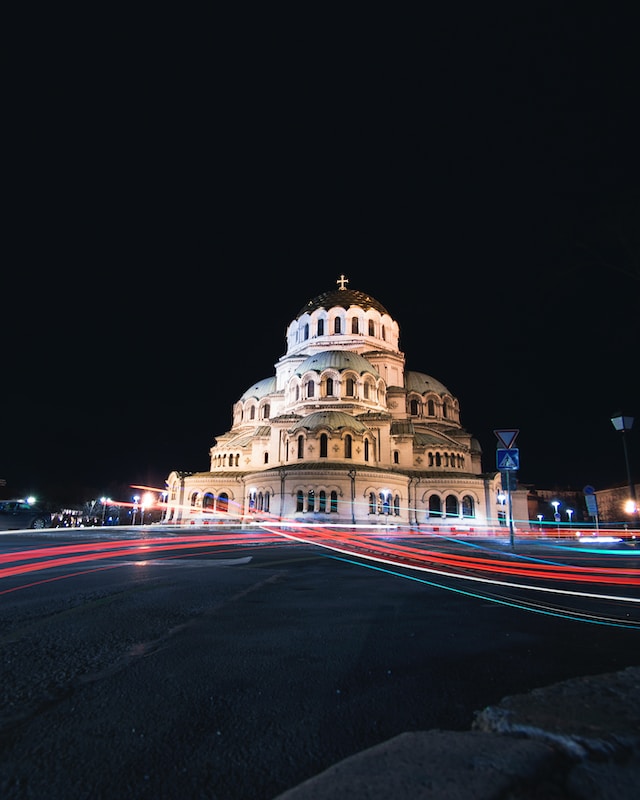
Aleksandr Nevskij, Sofia, Bulgaria
Co-Working Spaces in Sofia
Sofia boasts a thriving co-working scene with spaces like betahaus and SOHO Sofia. These hubs offer fast internet, comfy workstations, and chances to network with fellow digital nomads.
Read on to discover more about Sofia’s top co-working spots and what they offer.
Betahaus
As a digital nomad who’s spent time in Sofia, I can’t say enough good things about Betahaus. This co-working powerhouse has four locations across the city, offering high-speed internet and flexible payment options that fit any nomad’s lifestyle.
I’ve found the community here to be diverse and inspiring, with specialists in graphic design, web development, HR, consulting, and architecture all working side-by-side.
During my stays, I’ve taken part in numerous events, workshops, and exhibitions organized by betahaus. These gatherings have been fantastic for networking and skill-sharing. The spaces are well-designed, fostering both productivity and collaboration.
From my experience running grounding and earthing workshops, I’ve seen firsthand how the right environment can boost creativity and well-being.
I’ve been particularly impressed with the fast internet speeds at betahaus. As someone who relies heavily on a stable connection for my research and online programs, this has been a game-changer.
The flexible payment options have also been a huge plus, allowing me to adjust my membership based on my travel schedule. Whether you’re in Sofia for a week or a month, betahaus has a plan that works.
SOHO Sofia
Moving on from betahaus, let’s explore another fantastic co-working space in Sofia: SOHO Sofia. This vibrant hub caters to creative professionals, offering fully equipped workplaces and event spaces.
I’ve found it to be an excellent choice for digital nomads seeking a productive environment.
SOHO Sofia boasts high-speed internet, essential for our work, along with well-appointed conference rooms for client meetings. The kitchenette provides a cozy spot for quick breaks and casual chats with fellow nomads.
What sets SOHO apart is its cultural vibe – they regularly host exhibitions and concerts, perfect for unwinding after a long day of work.
For those needing extra services, SOHO offers multimedia equipment rental and catering options. They even provide postbox rental, a handy feature for long-term stays. With its blend of work facilities and social opportunities, SOHO Sofia creates an ideal atmosphere for digital nomads to thrive professionally while enjoying Sofia’s creative scene.
Networking Premium Coworking
Networking Premium Coworking is a digital nomad’s dream in Sofia. I’ve found it to be the largest coworking chain in Bulgaria, boasting 8 locations across the country. With over 1,000 members, it offers a vibrant community for remote workers like me.
I love the variety of spaces available, from the artsy Plovdiv Kapana to the central Rakovska HQ.
What sets Networking Premium apart is its event-driven approach. They’ve hosted more than 1,200 events and conferences, perfect for expanding your professional network. The 11 event venues provide ample opportunities to connect with fellow nomads and local entrepreneurs.
Next, let’s explore some accommodation options that’ll make your stay in Sofia comfortable and convenient.
Accommodation Options
Finding a place to stay in Sofia is easy and affordable. Digital nomads have various options to suit their needs and budget, from short-term rentals to shared living spaces.
Short-term Rentals
I’ve found that short-term rentals are a perfect fit for digital nomads in Sofia. Flatio and Wunderflats offer fully furnished apartments with reliable internet, essential for remote work.
These places come equipped with everything you need, from kitchenware to linens, making your transition smooth.
For those traveling with pets or looking to avoid deposits, Homelike and Nomad Stays have great options. I particularly like TripOffice’s guarantee of stable internet in all their properties.
It’s a relief to know you won’t face connectivity issues while working.
Selina and Outsite blend accommodation with coworking spaces, creating a unique experience for nomads. I’ve used these myself and love the built-in community aspect. You’ll meet fellow travelers and potentially find your next project collaborator right where you’re staying.
These setups truly cater to our nomadic lifestyle, offering flexibility and functionality in one package.
Shared Apartments
Shared apartments in Sofia offer an excellent balance of community living and private study areas for digital nomads like me. I’ve found these spaces provide a cost-effective alternative to private rentals, with prices ranging from €1,171 to €1,492 per month.
This setup allows me to connect with fellow remote workers while maintaining my own personal space.
Coliving.com has been a great resource for finding affordable shared living options in Sofia. The platform offers a variety of choices that cater to different needs and budgets. I appreciate how these shared apartments often come fully furnished, saving me the hassle of buying and moving furniture for short-term stays.
Living in a shared apartment has enhanced my digital nomad experience in Sofia. I’ve made new friends, expanded my professional network, and gained local insights from my roommates.
The communal areas are perfect for brainstorming sessions or casual hangouts, while the private rooms provide the quiet I need for focused work.
Hostels for Digital Nomads
I’ve discovered some fantastic hostel options for digital nomads in Sofia. Hostel Mostel stands out as a top choice, offering long-term stays starting at just 10-20 Euros per night.
It’s perfectly situated near the Ivan Vazov National Theater, putting you right in the heart of the action. Many hostels here go beyond just providing a bed. They’ve created communal spaces and coworking areas, making it easy to connect with fellow nomads and get work done.
During my stays, I’ve found these hostels to be more than just affordable lodging. They’re vibrant hubs where ideas flow and friendships form. The central locations mean you’re never far from Sofia’s best sights and amenities.
Plus, with shared kitchens and common areas, you can save money on meals while enjoying the company of other travelers. It’s a win-win for budget-conscious nomads looking for both workspace and community.
Leisure and Recreation
Sofia offers a wealth of leisure activities for digital nomads. The city boasts lush parks and fascinating cultural sites that provide a perfect balance to work life.
Parks and Green Spaces
I love the abundance of green spaces in Sofia. Borissova Garden, the city’s oldest and largest park, is my favorite spot to unwind. It’s perfect for a morning jog or a leisurely afternoon stroll.
The park’s expansive grounds offer plenty of room for outdoor activities, making it a go-to place for fitness enthusiasts and nature lovers alike.
Other parks like Yuzen, Loven, Doctor’s Garden, and Zaimov also provide excellent options for outdoor recreation. As a digital nomad, I find these green oases incredibly valuable. They offer a refreshing break from work and a chance to connect with nature.
The parks’ well-maintained paths are ideal for cycling, while their lush lawns invite picnics and relaxation.
These green spaces have become my outdoor office on pleasant days. I often bring my tablet to work amidst the serene surroundings. The parks’ Wi-Fi hotspots allow me to stay connected while enjoying the fresh air.
Next, let’s explore the vibrant nightlife and social scene that Sofia has to offer.
Museums and Cultural Sites
Sofia’s museums and cultural sites offer a treasure trove for history buffs and art lovers. I’ve spent countless hours exploring the National History Museum, which houses over 650,000 artifacts spanning Bulgaria’s rich past.
The National Archaeological Museum, located in a former Ottoman mosque, showcases ancient Thracian gold and Roman sculptures that never fail to captivate me.
For a unique experience, I often visit the Earth and Man National Museum. Its collection of over 20,000 minerals from around the world is truly breathtaking. As a digital nomad, I find these museums provide a perfect balance to my work routine, offering inspiration and a deeper understanding of Bulgarian culture.
Sofia’s religious architecture is equally impressive. The St. Alexander Nevski Cathedral, with its neo-Byzantine style and gold-plated domes, is a sight to behold. The nearby Russian Church, with its colorful onion domes, adds a touch of Moscow to Sofia’s skyline.
These cultural sites provide endless photo opportunities for my social media posts. Next, let’s explore the vibrant nightlife and social scene that Sofia has to offer.
Nightlife and Social Scene
Sofia’s nightlife pulses with energy and excitement. From trendy bars to lively clubs, the city offers a diverse social scene for digital nomads to unwind and connect.
Bars and Clubs
I’ve found Sofia’s nightlife to be vibrant and diverse, perfect for digital nomads looking to unwind after a day of work. The city center and Studentski grad are buzzing hubs for evening entertainment.
I love spots like One More bar and Memento for their laid-back atmosphere and great drinks. For those seeking a livelier scene, Exe Club and MixTape5 offer pulsing beats and dance floors that keep going until the early hours.
Piano bars add a touch of sophistication to Sofia’s nightlife. The Corner and Sinatra are my go-to places for smooth tunes and classy cocktails. If you’re in the mood for a more eclectic experience, Bar Petak and K.E.B.A.
offer unique vibes and interesting crowd mixes. Next, let’s explore the live music venues that make Sofia’s nightlife even more exciting.
Live Music Venues
Sofia’s live music scene is vibrant and diverse, perfect for digital nomads seeking entertainment. Sofia Live Club stands out as a premier venue, hosting both local and international acts across various genres.
I’ve enjoyed electrifying performances there, from jazz to rock. The sound quality and atmosphere are top-notch, making it a favorite among music lovers.
Joy Station is another gem I’ve discovered. This cozy spot offers an intimate setting for acoustic sets and indie bands. The warm lighting and friendly staff create a welcoming vibe that’s ideal for unwinding after a day of remote work.
They often feature up-and-coming Bulgarian artists, giving visitors a taste of the local talent.
Music festivals add excitement to Sofia’s calendar. From electronic dance music extravaganzas to folk celebrations, there’s always something happening. These events provide excellent opportunities to network with fellow nomads and locals alike.
Sofia’s music venues cater to all tastes, ensuring digital nomads can find their rhythm in this dynamic city.
Networking Events for Expats
I’ve found Sofia’s expat community to be incredibly welcoming. The city hosts numerous networking events that bring digital nomads and locals together. These gatherings range from casual meetups to industry-specific mixers, offering something for everyone.
As the founder of an organization focused on natural health practices, I’ve attended several of these events. They’ve been invaluable for building both social and professional connections.
I’ve met fellow entrepreneurs, freelancers, and even potential clients at these gatherings. The diverse mix of attendees creates a vibrant atmosphere ripe for idea exchange and collaboration.
Many of these events take place in coworking spaces like betahaus Sofia or trendy bars around Graf Ignatiev Street. Some focus on specific topics like blockchain or digital marketing, while others are more general.
Regardless of the format, they all share a common goal: fostering a sense of community among Sofia’s international residents. Now, let’s explore the city’s thriving nightlife and social scene beyond these networking events.
Day Trips and Excursions
Sofia offers exciting day trips for digital nomads to explore Bulgaria’s natural beauty and rich history. Vitosha Mountain provides hiking trails and stunning views, while the ancient city of Plovdiv boasts Roman ruins and colorful old town streets.
These adventures let you recharge and experience more of Bulgaria’s culture beyond the capital.
Vitosha Mountain
Vitosha Mountain is a natural gem right on Sofia’s doorstep. I’ve hiked its trails countless times, and it never fails to impress me. As the oldest nature park on the Balkan Peninsula, Vitosha offers a perfect escape for digital nomads seeking outdoor adventures.
I’ve found popular routes starting from Knyazhevo and Dragalevtsi Quarters, leading up to the Aleko locality.
During my visits, I’ve enjoyed hiking, mountain biking, and even skiing in winter. The mountain’s diverse landscape includes the Bistrishko Branishte Reserve, a UNESCO biosphere reserve that I always recommend exploring.
For digital nomads looking to balance work and play, Vitosha provides an ideal setting for recharging and staying active. Next, let’s explore some exciting day trips you can take from Sofia.
Plovdiv Day Trip
I love taking a day trip to Plovdiv from Sofia. It’s an easy 2-hour bus or train ride away and offers a perfect blend of history and culture. Plovdiv, one of the world’s oldest continuously inhabited cities, dates back to 4,000 B.C.
Its Thracian and Roman ruins are a sight to behold.
My favorite part of visiting Plovdiv is exploring the Old Town. I wander through narrow cobblestone streets, admiring the beautifully preserved Bulgarian Revival architecture. The Roman Theatre, still used for performances today, never fails to impress me with its ancient grandeur.
For a taste of local culture, I often join a wine tasting tour in the nearby Thracian Valley. The region’s wines are excellent, and the scenery is breathtaking. If time allows, I’ll visit the Bachkovo Monastery or Asen’s Fortress, both easily accessible from Plovdiv.
These spots offer stunning views of the Rhodope Mountains and a glimpse into Bulgaria’s rich history.
Dining and Cuisine
Sofia’s dining scene offers a mix of traditional Bulgarian fare and global flavors. From hearty local dishes like tarator and moussaka to Mediterranean and Chinese restaurants, the city caters to all tastes.
Try the local brandy or explore international beverages while enjoying the vibrant culinary landscape. Read on to discover more about Sofia’s food culture and top dining spots.
Bulgarian Traditional Eateries
I’ve savored some incredible meals at traditional Bulgarian eateries during my time in Sofia. These spots serve up hearty, flavorful dishes that warm both body and soul. Vodenitsata, Manastirska magernitsa, and Pod Lipite are local favorites I highly recommend.
They offer classic fare like shopska salad, tarator (cold cucumber soup), stuffed peppers, moussaka, and banitsa (cheese pastry).
For a quick bite, street food vendors dish out tasty kebapcheta (grilled meat rolls) and langos (fried flatbread). As someone who’s researched natural health practices for years, I appreciate how Bulgarian cuisine uses fresh, local ingredients.
The flavors and textures transport you straight to the heart of Balkan culinary traditions. My work in grounding has taught me the importance of connecting with local culture, and food is a delicious way to do just that in Sofia.
International Cuisine Options
Moving from traditional Bulgarian fare, Sofia’s culinary scene offers a world of flavors for digital nomads craving international cuisine. I’ve discovered a thriving food culture that caters to global tastes.
Made in Home and Shtastlivitsa Bistro stand out as popular spots for diverse international dishes. These eateries serve up a mix of Mediterranean, Greek, and Turkish-inspired meals, satisfying my cravings for familiar flavors from around the globe.
Street food in Sofia adds another layer to the international dining experience. I often grab quick bites like kebapcheta or langos from local vendors. These street eats blend Bulgarian traditions with international influences, creating a unique fusion that reflects Sofia’s cosmopolitan vibe.
For digital nomads like me, this variety ensures I never get bored with my dining options, even during extended stays in the city.
Practical Tips for Living in Sofia
Living in Sofia offers unique experiences, from efficient public transport to delicious tripe soup. I’ll share tips on local transportation, language basics, and essential services to make your stay smooth and enjoyable.
Read on to learn how to navigate Sofia like a pro and make the most of your digital nomad adventure in this vibrant Bulgarian capital.
Local Transportation
I’ve found Sofia’s local transportation system to be efficient and budget-friendly for digital nomads. The city boasts two underground metro lines, making it easy to zip around quickly.
For surface travel, buses and trams are my go-to options. A single ride costs just 0.82 EUR, which is a steal compared to many European cities.
For those planning to stay longer, I recommend grabbing a monthly pass. At about 25 EUR, it’s a great value for unlimited rides on buses and trams. Taxis are another convenient option, especially for late-night trips.
The fare runs around 0.50 EUR per kilometer, which is reasonable for short hops across town.
I often use a mix of these options to get around Sofia. The metro is perfect for longer journeys, while buses and trams work well for exploring different neighborhoods. For those times when I’m in a hurry or carrying heavy gear, taxis come in handy.
With these choices, I’ve found it easy to navigate the city without breaking the bank.
Language and Communication
Moving from local transportation to language matters, I’ll share insights on communicating in Sofia. Bulgarian is the official language here, but don’t worry if you’re not fluent. English is widely spoken, especially among younger locals and in tourist areas.
Many signs, menus, and information are available in English, making navigation easier for digital nomads.
I’ve found that learning a few basic Bulgarian phrases goes a long way. Simple greetings like “zdravei” (hello) or “blagodarya” (thank you) can help break the ice and show respect for the local culture.
For work-related communication, most co-working spaces and cafes cater to English-speaking nomads. If you need to use your smartphone or kindle app for translations, you’ll find reliable internet and mobile networks throughout the city.
Conclusion
Sofia, Bulgaria offers digital nomads an exciting blend of affordability, culture, and opportunity. I’ve found this Balkan gem to be a perfect mix of work-friendly spaces and captivating leisure activities.
From cozy cafes to stunning mountain views, Sofia caters to every nomad’s needs. The city’s welcoming atmosphere and growing tech scene make it an ideal base for remote workers. My experience here has shown that Sofia is more than just a destination – it’s a vibrant community waiting to be explored by adventurous digital professionals.

